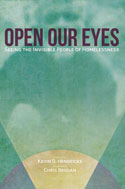Today is Veteran’s Day. The veterans in my family include my wife’s grandparents (Eddie & Sunny Storseth), both of whom served in the Navy during World War II; my maternal grandfather, John E. Brown, who served in the military police for the Marines during World War II; and my paternal grandfather, John Boyett, who became a Nazi prisoner-of-war during World War II.
I posted this last year, but in honor of the veterans in my family I’m going to re-run it today. A version of this story appears in O Me of Little Faith.
For the last few days, John Boyett — whom we call “Paw-Paw” — has been hospitalized with double pneumonia and other serious ailments. He’s in his late 80s.
——————
The Day I Met Paw-Paw
When I was a kid, I thought I knew my grandfather. His name was John Boyett, but we called him “Paw-Paw.” He had a broad nose and a neck crisscrossed with wrinkles. He smelled like a blend of the minty Copenhagen he dipped and the sawdust of his workshop. He built stuff, and had all kinds of tools. He watched The Today Show during breakfast and listened to Paul Harvey at lunch and always made us grilled ham-and-cheese sandwiches. He sang a barrel-deep bass.
 I thought I knew Paw-Paw, until I went to an air show with him when I was 12. One of the aircraft on display was an old, World War II-era B-17 Bomber, the legendary “flying fortress.” It was open for viewing, so Paw-Paw took me aboard. As we climbed inside, he began to tell me about the plane: where the bombs were stored and how they were released, where the guns were stationed and the size of the bullets, what kinds of missions the planes flew and in what theaters. I was impressed. He knew a lot about this airplane.
I thought I knew Paw-Paw, until I went to an air show with him when I was 12. One of the aircraft on display was an old, World War II-era B-17 Bomber, the legendary “flying fortress.” It was open for viewing, so Paw-Paw took me aboard. As we climbed inside, he began to tell me about the plane: where the bombs were stored and how they were released, where the guns were stationed and the size of the bullets, what kinds of missions the planes flew and in what theaters. I was impressed. He knew a lot about this airplane.
“How do you know all this stuff?” I asked from the back of the fuselage.
“Because I was sitting right about where you are when we got shot down.” My eyes grew as wide as Paw-Paw’s nose, but he kept talking.
“The wings caught fire, and the heat was about to weld the door shut. I couldn’t see anything because of the smoke. So I backed up right there — he pointed to the fuselage wall opposite the hatch through which we’d just entered — and I jumped at the door with both feet. Went right through and started falling until I remembered to open my parachute.” Then his voice dropped an octave. “Most of my buddies died.”
“Were you hurt?” I asked. He lifted a pants leg to show me a cluster of pock-marked scars. “Got hit by some shrapnel,” he said. I had to ask what “shrapnel” was.
Before long, I’d heard most of the story — at least, the parts he wanted to tell me. Based in Italy, my granddad was on one of his last bombing runs as a 21-year-old side-gunner and flight engineer on the B-17, when his plane encountered enemy fire over Austria. After reluctantly bailing from his post — and his plane — he parachuted directly into Nazi territory. Paw-Paw ended up in a succession of German prisoner-of-war camps. He spent more than a year in captivity, subsisting on watery “stew” and thinking he’d never see his family again. He held on mentally by reading and rereading a bundle of letters from his bride and my grandmother, Mary Ellen, whom he’d left behind in Hollis, Oklahoma.
His escape came as suddenly as his capture. Paw-Paw and a number of other prisoners were eventually herded out of the Stalag and forced into a cross-country trek at the end of winter, in temperatures so cold he had to set fire to his precious letters to keep his fingers from freezing. “It was intended to be our death march,” he told me.
[Note from Jason: This forced march of Allied P.O.W.s by their Nazi captors occurred in early 1945 and is known by several names, but you can read about it at Wikipedia under “The March.”]
After months of marching — and nearly 500 miles — the captors and prisoners neared the Germany-Poland border. Without warning, a Jeep crested the hill ahead of them, driven by a British colonel who’d become lost and accidentally veered into enemy territory. Paw-Paw’s German guards assumed it was the lead vehicle in an Allied assault, and they fled. The prisoners stood there stunned, alone and shivering. They had stumbled into freedom, liberated by a Brit’s bad navigation.
I thought I knew Paw-Paw until I heard him tell this story inside the hollow shell of a vintage airplane. His version is usually punctuated with much greater detail, buttressed by self-deprecating humor and, occasionally, some sadness. He tells it rarely. It’s a powerful story, but a difficult one — he didn’t speak of those events at all until many years after the war. I realize now there is much I don’t know about my grandfather. The man I do know was made during those months as a POW, during that march, upon that liberation. To know Paw-Paw is to know his story.
In recent years, he has confessed to our family that he never really knew why God let him survive that flight, or those months in the Stalag, or the death march. At least, he didn’t know until his kids grew up. Then my generation arrived — my brother and sister and me, and our cousins. My brother runs an apartment ministry. My sister worked for Young Life and is a mom. One cousin is a teacher. The others are doting fathers and husbands. If Paw-Paw had died in the war, we’d never have existed. “It’s for you kids,” he tells us, his voice breaking with emotion. “That’s why I survived. So you guys can be here. And for them, too.” He nods toward our sons and daughters. His great-grandchildren, full of promise and potential.
In his mind, we’re here — all of us — to change the world he helped save in World War II. We’re here to show love. To live lives of compassion. To raise our families and communicate truths and impact the places where we’ve ended up. We’re here because Paw-Paw survived. And because I know his story, I continually ask myself if I’m measuring up. Like the elderly title character at the end of Saving Private Ryan, I see my granddad and I wonder:
Was I worth it? Am I good enough? Is my life worthy of his sacrifices? Is who I am worthy of his amazing survival? Does the legacy I’m creating justify the legacy he left me?
If the answer to any of those is “no,” then things need to change for me.
When I first heard his story, Paw-Paw changed. Every time I reflect upon it, I change.
——————
Tell a veteran “thank you” today, and live a life worthy of those who have sacrificed for you.
——————
Update: At Mama:Monk, my sister also has a post about our grandfather. It’s a lot funnier than my post, and totally worth reading, even if we disagree about how to spell Paw-Paw.

